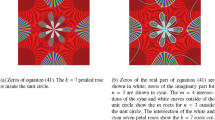Abstract
We consider in this paper a class of vector valued processes that have the form Y n + 1 = A n ( Y n ) + B n . B n is assumed to be stationary ergodic and A n is assumed to have a divisibility property. This class includes linear stochastic difference equations as well as multi-type branching processes (with a discrete or with a continuous state space). We derive explicit expressions for the probability distribution as well as for the two first moments of state vectors at the stationary regime. We then apply this approach to derive two formalisms to describe the infinite server queue. The first is based on a branching process approach adapted to phase type service time distributions. The second is based on a linear stochastic difference equation and is adapted to independent and generally distributed service times with bounded support. In both cases we allow for generally distributed arrival process (not necessarily i.i.d. nor Markovian).

Similar content being viewed by others
Notes
A random filed is an extension of a stochastic process where the “time” parameter is not a scalar but a vector in ℝ+ m.
Note that \( ( J - b_i {\bf 1}^T ) \widehat G^i \) is a row vector of dimension |Θ| whose lth entry equals \(E[ B_0^i - b_i | \theta_0 = l ] \pi( l ) \).
References
Altman E (2002) Stochastic recursive equations with applications to queues with dependent vacations. Ann Oper Res 112(1):43–61 Apr
Altman E (2005) On stochastic recursive equations and infinite server queues. In: Proceedings of IEEE infocom, Miami, 13–17 March 2005
Altman E, Barman D, Tuffin B, Vojnovic M (2006) Parallel TCP sockets: simple model, throughput and validation. In: IEEE Infocom, Barcelona, 23–29 April 2006
Altman E, Fiems D (2007) Expected waiting time in symmetric polling systems with correlated vacations. Queueing Syst 56:241–253
Athreya KB, Jaggers P (eds) (1997) Classical and modern branching processes series: the IMA volumes in mathematics and its applications, vol 84. Springer, Berlin Heidelberg New York
Athreya KB, Vidyashankar AN (2001) Branching processes. In: Shanbhag DN (ed) Handbook of statistics 19: stochastic processes: theory and methods. Elsevier, Amsterdam
Baccelli F, Brémaud P (2003) Elements of queueing theory, 2nd edn. Springer, Berlin Heidelberg New York
Baccelli F, Hong D (2002) AIMD, fairness and fractal scaling of TCP traffic. In: Proc IEEE INFOCOM, vol 1. IEEE, Piscataway, pp 229–238
Bertoin J (2002) Lévy processes. Cambridge University Press, Cambridge
Bienaymé IJ (1845) De la loi de la multiplication et de la durée des familles. Soc Philomath Paris Extraits Ser 5:37–39
Borel E (1942) Sur lemploi du théorème de Bernoulli pour faciliter le calcul dune infinité de coefficients. Application au problème de lattente à un Guichet. Comptes Rendus Hebd des Séanc de lAcadémie des Sciences 214:452–456
Brandt A, Franken P, Lisek B (1992) Stationary stochastic models. Akademie, Berlin
Carmona R, Lacroix J (1990) Spectral theory of random scrœdinger operators. Birkhäuser, Boston
Dumas V, Guillemin F, Robert P (2002) A Markovian analysis of additive-increase multiplicative-decrease algorithms. Adv Appl Probab 34(1):85–111
Eliazar I (2008) On the G/GI/infinity discrete-time queue. Probab Eng Inf Sci 22:557–585
Galton F, Watson HW (1874) On the probability of the extinction of the families. J R Anthropol Soc Lond 4:138–144
Gjessing HK, Aalen OO, Hjort NL (2003) Frailty models based on Lévy processes. Adv Appl Probab 35:532–550
Glasserman P, Yao DD (1995) Stochastic vector difference equations with stationary coefficients. J Appl Probab 32:851–866
Grishenchkin SA (1992) On a relation between processor sharing queues and Crump-Mode-Jager branching processes. Adv Appl Probab 24:653–698
Grishenchkin SA (1992) Multiclass batch arrival retrial queueus analyzed as branching processes with immigration. Queueing Syst 11:395–418
Groenvelt R, Altman E (2005) Analysis of alternating-priority queueing models with (cross) correlated switchover times. Queueing Syst 51:199–247
Kendall DG (1951) Some problems in the theory of queues. J R Stat Soc Ser B 13:151–185
Khoshnevisan D, Xiao Y, Zhong Y (2003) Local times of additive Lévy processes. Stoch Process their Appl 104:193–216
Kolmogorov AN (1938) On the solution of a biological problem. In: Porc. of Tomsk University, vol 2. Tomsk University, Tomsk, pp 7–12 (in Russian)
Le Gall JF (2000) Random trees and spatial branching processes, vol 9. Maphysto lecture notes series. University of Aarhus, Aarhus
Miorandi D, Altman E (2006) Connectivity in ad–hoc networks: a queueing theoretical approach. Wirel Netw 12:573–587
Moller N, Barakat C, Avrachenkov K, Altman E (2007) Inter-protocol fairness between TCP New Reno and TCP Westwood+. In: Proceedings of NGI 2007 (conference on next generation internet networks), Trondheim, May 2007
Quine MP (1970) The multi-type Galton-Watson process with immigration. J Appl Probab 7:411–422
Resing JAC (1993) Polling systems and multi-type branching processes. Queueing Syst 13:409–426
Sato K (1999) Lévy processes and infinitely divisible distributions. Cambridge University Press, Cambridge
Sevastyanov BA (1957) Limit theorem for branching processes of special form. Theor Probab Appl 2:121–136 (in Russian)
Steele JM (1989) Kingman’s subadditive ergodic theorem. Ann Inst Henri Poincaré 25(1):93–98
Yashkov SF (1988) The non-stationary distribution of numbers of calls in the M/G/1 processor-sharing queue. In: Proc. 3rd int. symp. on systems analysis and simulation, vol 2. Berlin, Akademie, 1988 (reprinted in Lukar PA, Schmidt B (eds) Advances in simulation, vol 2. Springer, Berlin, pp 158–162)
Yashkov SF, Yashkova AS (2007) Processor sharing: a survey of the mathematical theory. Autom Remote Control 68(9):1662–1731
Zukerman M (1989) Bandwidth allocation for bursty isochronous traffic in a hybrid switching system. IEEE Trans Commun 37(12) Dec
Acknowledgement
This work was supported by the EuroNF network of excellence.
Author information
Authors and Affiliations
Corresponding author
Rights and permissions
About this article
Cite this article
Altman, E. Semi-linear Stochastic Difference Equations. Discrete Event Dyn Syst 19, 115–136 (2009). https://doi.org/10.1007/s10626-008-0053-4
Received:
Accepted:
Published:
Issue Date:
DOI: https://doi.org/10.1007/s10626-008-0053-4




